|
|
||||||
|
|
|

by Dr. Carlo Ricci
Children need free time and lots of it. Free time is valuable time and not wasted time. I believe so strongly in unschooling because it gives the children the time they need to structure their own learning. I believe that the more free time children have and the more comfortable they become with having the free time, the more opportunities they will create for themselves to learn and to grow and to unfold. In what follows I will share with you some observations that I have recently made that will help elucidate this point.

I have two daughters ages two and four. My four-year daughter was sitting at the kitchen table and she called me over. She was “reading” her children’s magazine that someone had subscribed to for her as a gift. She noticed that one of the activities described how to make a clock, and so she wanted to make a clock. She is familiar with analog watches because she has one and has had it for a long time. She has been able to tell time on it fairly accurately, initially to my surprise, for awhile now. Anyway, we gathered the materials that she needed to make the clock and she started making a modified, and in my mind improved, version of what they outlined. She picked up her marker and started to write the numbers. She quickly realized that she does not know how to write the numbers; although, she could write all of her letters very well, numbers is something that she recognizes, but up until now she has never had the need or will to try and write them out. This, however, was not a big deal. She proceeded to try and write the numbers and she asked a few (very, very few) questions and points of clarification that she needed along the way. Literally, within minutes she was writing her numbers. She clearly could write her numbers, she was capable but she simply had never tried because she did not have a need.
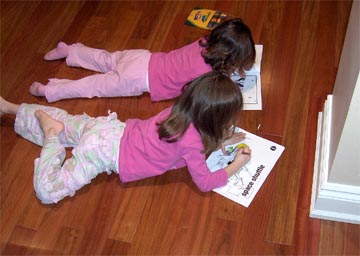
Since the making of the clock, she has been finding all kinds of occasions to practice writing her numbers. She has made many clocks that have forced her to practice her numbers. She has at times just written numbers down. Perhaps, her most favourite number writing activity lately has been Sudoku. My wife has recently become interested in Sudoku, as have so many others, and my daughter enjoys writing the Sudoku numbers in the appropriate boxes for my wife; in short, she enjoys working on the Sudoku puzzles with me and my wife and in that enjoyment she is continuing to practice writing her numbers. She is not being drilled and skilled to write numbers for the sake of learning to write numbers, but she is internally motivated to write numbers because she is living her life and at this stage of living her life she feels the need to make clocks and do Sudoku which means, as an aside, that she has to learn to write her numbers.

One of my neighours recently shared with my wife how she told her children something to the effect that they had such a miserable day because they were home for the first time all summer without being in camp or some other adult planned activity for them. She then asked them how they would like doing this all the time. This got me thinking. The question that came to mind for me was how could children with freedom come to loathe it? In other words, why is it that they may have felt so bored and the need for someone or something to entertain them? Why could they not find things to do on their own? This led me to observe and reflect about my children and how they deal with free time.
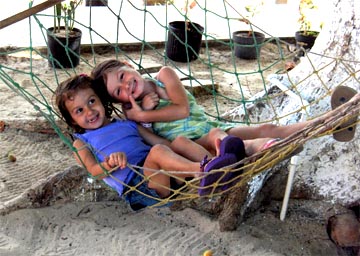
My children have been fortunate to have lots of free time. We have been fortunate that I am in a position where I can do a lot of my work from home and they are touchingly very respectful of the time I need to do my work. The other morning I was working upstairs and I could periodically hear them downstairs playing. This lasted for at least two hours and it is not atypical. I do not recall them ever saying that they are bored and they are very good at finding things that they want to do. While I was upstairs I heard a lot of giggling and later I discovered what they were doing. They had made up a very creative game. They had pulled their coloured plates out of the kitchen drawer and they were blindfolding each other and trying to figure out what colour plate the non-blindfolded person was holding up. That they can play so happily for such long periods of time on their own is, I believe, because they have always had plenty of free time and they have become comfortable with deciding what they want to do in their free time and understanding that they need to fill their own free time and not have their time filled by someone else.
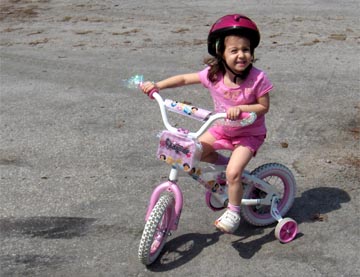
One day this past summer, I came home to find my younger daughter out in our backyard lying on lawn chair all by herself. This image of her sticks out in my mind as a peaceful moment where she was just Being. I opened the sliding door that leads out to the covered patio and this awoke her from her place. She just looked at me and said, “Get me some milk.” To me this enjoyment of just Being, of doing nothing but Being is a gift that we all have to learn to re-embrace. We need to slow down our too hurried lives.

Recently, I was at a local park and I had an encounter that highlighted for me the differences in orientations to parenting. It reminded me of how influential our philosophies of life are in how our everyday experiences are lived out and in how we perceive our and others way of life. When we go to the park, not surprisingly given what I have shared so far, my children have a lot of freedom and I do not follow them around scrutinizing their every move. If they want me to help them negotiate a particular structure I help them, but if they feel like playing on their own and doing their own thing I honour that. So on this occasion, I was sitting on a bench reading the newspaper and relaxing while my children were having a great time doing their own thing. When all of a sudden I intuitively felt this mother’s disapproving gaze. For my part I felt that she was way too smothering of her, what I would estimate to be, four-year-old child. I felt that she did not let her child go anywhere without her being inches away from her. And I imagine that from her world view she was thinking the exact opposite of me. She must have been thinking that I was a negligent parent more concerned with reading the newspaper than in interacting and watching my children. Because of my world view and my observations, I believe that my children have and continue to benefit from their freedom. I believe that we need to respect their space and not be too overbearing. We need to allow them to explore and we need to trust their judgements. We need to allow them to lean to judge for themselves what they are and are not capable of doing. To do this we need to let them be free.
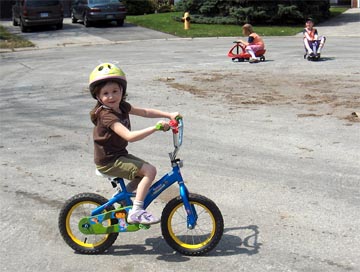
In conclusion, printing numbers, free time and play are not separate activities as perhaps is suggested by the title of this piece, but each of these activities and so many, many more are interconnected in a complicated web. They are not separate from each other but they support each other. Because children have lots of free time and the support to structure it as they see fit and to play they can accomplish their goals. I repeat, I believe that the more free time children have and the more comfortable they become with having the free time, the more opportunities they will create for themselves to learn and to grow and to unfold.
Biography
|
Design by Anita Roy, Nanoose Bay, British Columbia |
|||
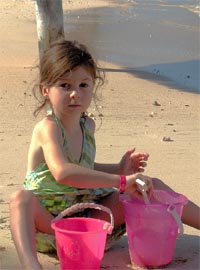
 Dr. Carlo Ricci currently teaches in the faculty of education's graduate program at Nipissing University and he founded and edits the online Journal of Unschooling and Alternative Learning (JUAL). He tries to incorporate the spirit of unschooling, democratic and learner centered principles in all of his classes. Everything of value that he has learned, he has learned outside of formal schooling. He has never taken a course in school connected to what he now teaches and writes about. He has taught in elementary and high school. He has also taught in undergraduate, teacher education programs and graduate programs. His personal schooling experience as a student and later as a teacher has inspired him to revolt against institutional schooling. He continues to heal from the wounds inflicted on him by formal schooling. He has two daughters ages 3 and 5 that he hopes will decide to unschool.
Dr. Carlo Ricci currently teaches in the faculty of education's graduate program at Nipissing University and he founded and edits the online Journal of Unschooling and Alternative Learning (JUAL). He tries to incorporate the spirit of unschooling, democratic and learner centered principles in all of his classes. Everything of value that he has learned, he has learned outside of formal schooling. He has never taken a course in school connected to what he now teaches and writes about. He has taught in elementary and high school. He has also taught in undergraduate, teacher education programs and graduate programs. His personal schooling experience as a student and later as a teacher has inspired him to revolt against institutional schooling. He continues to heal from the wounds inflicted on him by formal schooling. He has two daughters ages 3 and 5 that he hopes will decide to unschool.